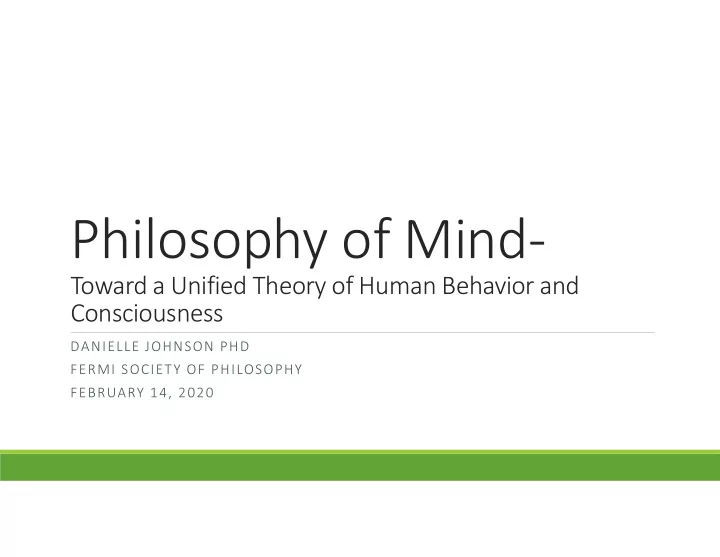

Philosophy of Mind- Toward a Unified Theory of Human Behavior and Consciousness DANIELLE JOHNSON PHD FERMI SOCIETY OF PHILOSOPHY FEBRUARY 14, 2020
History of ‘The Wall’
Alleviate Human Solve Science Suffering
Biology The “Self” Mind The Mind/Body Problem Are there mental things in the world ? Soul What is Consciousness? Heart Unified Theory of Human Behavior and Consciousness #UTHBC
Overview of Presentation Today I will present: ◦ Overview of the Mind-Body Problem ◦ Discuss the main positions and their objections ◦ Possible solutions drawing on my UTHBC framework
Descartes’ Dualism I can doubt that my body exists. I can doubt that the world exists. I can doubt that my brain exists. I cannot doubt that I doubt I cannot be deceived that I am thinking. If I am doubting and thinking, I must exist. Cogito ergo sum If I exist (doubt and think), I must have a mind. Therefore I cannot doubt I have a mind. I cannot doubt I have a mind, yet I can doubt I have a body/brain, ◦ indiscernibility of identicals , → my mind cannot be my brain.
The Mind-Body Problem What things exist? How do we explain the existence of or interaction with the other stuff?
What is Consciousness? What is it like to be a bat (Nagel) The Hard Problem of Consciousness (Chalmers) ◦ Most philosophers now think of how to solve the hard problem as the Mind-Body Problem ◦ How is it that something immaterial (like consciousness) can arise from something material (like the brain).
What Kind of Things Exist? Monism ◦ The world is made of one kind of stuff ◦ Idealism ◦ Materialism Dualism ◦ The mental and physical are of two distinct things ◦ Mental phenomena are non-physical
Idealism Reality is either indistinguishable or inseparable from human understanding and perception Ontological Idealism ◦ Something mental is the foundation of reality Epistemological Idealism ◦ Things outside of the mind exist ◦ “Everything that we can know about this mind-independent “reality” is held to be so permeated by the creative, formative, or constructive activities of the mind (of some kind or other) that all claims to knowledge must be considered, in some sense, to be a form of self-knowledge” (Guyer & Horstmann, 2019)
Materialism/Physicalism Reality is all physical, there isn’t anything extra. Eliminative Materialism ◦ Our understanding of our minds is folk psychology and mental states do not exist ◦ Like witches, fears and hope will someday not be a part of science Mind-Brain Identity Theory (Reductive Materialism) ◦ States an processes of Mind are identical to states and processes of the brain ◦ All mental phenomena ultimately reduce to physical phenomena ◦ Objection-multiple realizability (carbon based C-fibers/same brain pattern for every belief) Functionalism ◦ Mental events are the functions they perform ◦ Stuff doesn’t matter, function does ◦ E.g. mousetrap
Objections to Materialism-Thought Experiments Mary’s Room ◦ Eliminative and reductive theories ◦ The existence of qualia Chinese Room ◦ Functionalism and computational theories ◦ Right function, but doesn’t pass the test for understanding
Dualism Mind and Body are distinct and mental phenomena are non-physical. Substance Dualism (Cartesian) ◦ The mental and physical are two independent substances, from two different realms Property Dualism ◦ Mind is a group of independent properties that emerge from and cannot be reduced to the brain ◦ Related to emergent materialism and Epiphenomenalism
Objections to Dualism How do the two realms interact? ◦ Physical realm-obey physical laws, occupy space ◦ Mental realm-don’t exists in space No one has been able to give a coherent explanation of the relationship between the physical and the mental So where do we go from here…? Mysterianism?
The Best of Both Worlds? We are made of matter and nothing else It is irrefutable that we have consciousness ◦ As such, matter is sometimes conscious What evidence is there to suggest that all matter isn’t conscious? ◦ Maybe it is the definition of matter that needs to be conceptualized Physics tells is what matter does-how it behaves ◦ Doesn’t tell us what matter is, so maybe its conscious
Panpsychism Things are material, but they all have an element of subjective experience (individual consciousness) There is something that it is like to be an electron
Biology The “Self” Mind Soul Authenticity Heart Self-Actualization Unified Theory of Human Behavior and Consciousness #UTHBC
References Chalmers, D. J. (1995). Facing up to the problem of consciousness. Journal of consciousness studies , 2 (3), 200-219. Chalmers, D. (2015). Panpsychism and panprotopsychism. Consciousness in the physical world: Perspectives on Russellian monism , 246-276. Churchland, P. S. (1989). Neurophilosophy: Toward a unified science of the mind-brain . MIT press. Garvey, J. (Ed.). (2011). The Continuum companion to philosophy of mind . Bloomsbury Publishing. Guyer, Paul and Horstmann, Rolf-Peter, "Idealism", The Stanford Encyclopedia of Philosophy (Winter 2019 Edition), Edward N. Zalta (ed.), URL = https://plato.stanford.edu/archives/win2019/entries/idealism McLaughlin, B., Beckermann, A., & Walter, S. (Eds.). (2009). The Oxford handbook of philosophy of mind . Clarendon Press.
References Nagel, T. (1974). What is it like to be a bat?. The philosophical review , 83 (4), 435-450. Penrose, R. (1989). The emperor’s new mind: Concerning computers, minds, and the laws of physics . Oxford: Oxford University Press. Penrose, R. (1994). Shadows of the Mind (Vol. 4). Oxford: Oxford University Press. Robinson, Howard, "Dualism", The Stanford Encyclopedia of Philosophy (Fall 2017 Edition), Edward N. Zalta (ed.), URL = https://plato.stanford.edu/archives/fall2017/entries/dualism Searle, J. R. (1995). The construction of social reality . New York: The Free Press. Stoljar, Daniel, "Physicalism", The Stanford Encyclopedia of Philosophy (Winter 2017 Edition), Edward N. Zalta (ed.), URL = https://plato.stanford.edu/archives/win2017/entries/physicalism
Recommend
More recommend